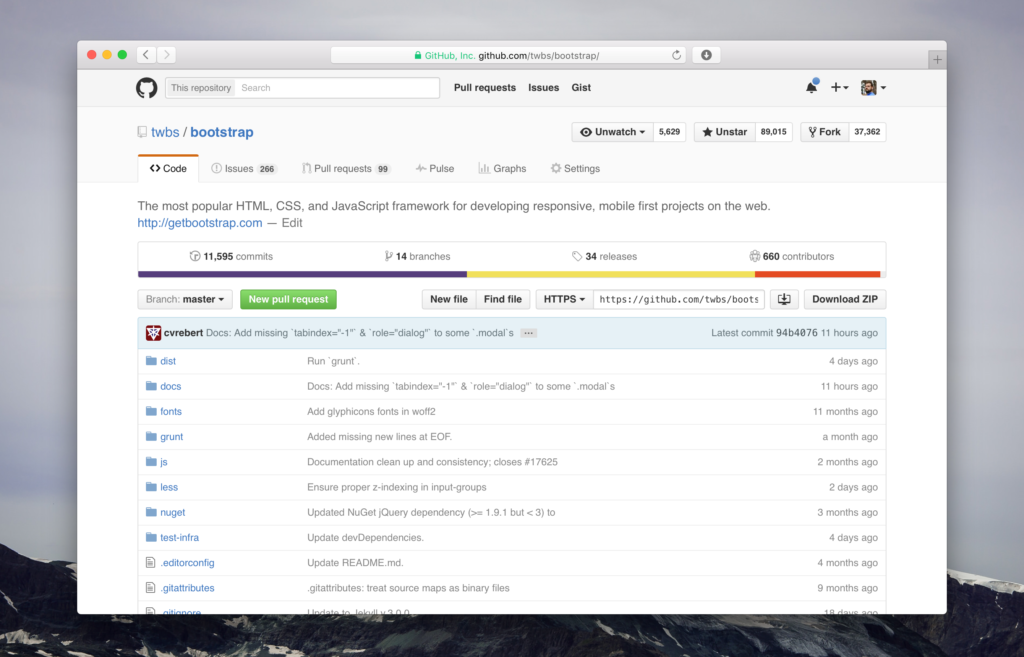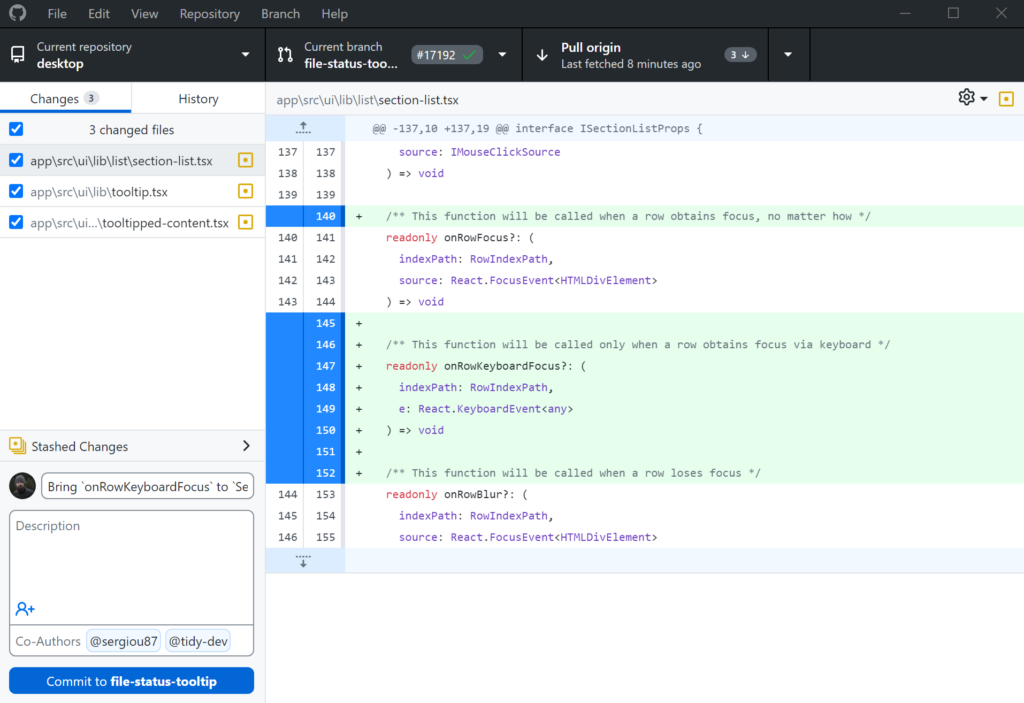I've spent decades in the software building industry, and today I offer you an in-depth review of GitHub review software. My aim is to arm you with the information you need to determine if GitHub aligns with your software development needs.

GitHub Software Product Overview
GitHub software is a code hosting platform that facilitates version control and collaborative workflow for coding. It primarily targets developers, teams, and enterprises looking to manage their code repositories and for their development projects. In fact, GitHub is often among the initial tools new software engineers encounter as they learn the professional standards for committing code.
The platform simplifies the code review process and fosters effective collaboration. Its major selling points include robust branch protection, inline commenting, and integration capabilities.
Moreover, public repositories on GitHub commonly serve as platforms for distributing open-source software. This setup allows multiple team members to collaborate on the same project, push their contributions to a GitHub repository, and subsequently review one another's code, review comments, or request changes.
Pros
- Branch Protection: GitHub offers advanced branch protection settings, which allow only authorized personnel to merge pull requests.
- Inline Comments: The tool supports inline commenting right within the pull request, providing context for better code quality.
- Integrations: GitHub can easily integrate with a multitude of other tools, thus enhancing your development ecosystem.
Cons
- Learning Curve: GitHub's feature-rich environment may overwhelm new users, making it challenging to harness its full power.
- Limited Customization: Though extensive, the settings and configurations could offer more customization options for specialized tasks.
- Performance: On rare occasions, the platform may experience lags, affecting real-time collaboration and updates.
Expert Opinion
When assessing Git review software, I consider factors like features, functionality, support, interface, and integrations. Among its peers in the software-building tech industry, GitHub stands out for its robust features and high level of reliability. However, its minor shortcomings include a steep learning curve for beginners and occasional performance hiccups.
Overall, GitHub excels in providing a comprehensive ecosystem for code collaboration and version control. If your priority is tight security controls, advanced branch features, and extensive integration capabilities, GitHub could be the ideal choice.
However, one thing worth mentioning is that the PullRequest code review tool often presents challenges in accurately displaying the differences (diff) between the source code and the modified code.
An additional feature we appreciate on GitHub is CI/CD automation through GitHub Actions. The ease with which it connects our code to various third-party tools has been a significant time-saver for us.
Lastly, we utilize GitHub for documentation via Markdown files. Keeping the docs alongside the code offers a consistent advantage.
GitHub Review: The Bottom Line
What distinguishes GitHub software from similar platforms is its commitment to streamlined code collaboration and robust version control. Its inline commenting feature stands out, allowing immediate and contextual feedback during the review process. Another unique offering is its extensive set of integration options, which cater to an array of third-party tools and services.
Overall, GitHub doesn't just offer a place to host your code; it provides a dynamic environment to nurture the entire coding lifecycle.
Gith Hub Deep Dive
Product Specifications
- Version Control - Yes
- Collaborative Coding - Yes
- Code Review - Yes
- Project Management - Yes
- Issue Tracking - Yes
- Continuous Integration - Yes
- Security Scanning - Yes
- Branch Protection - Yes
- Access Controls - Yes
- Native Integrations - Yes
- Code Snippets - Yes
- Wikis and Documentation - Yes
- Activity Feed - Yes
- Real-Time Updates - Yes
- Inline Commenting - Yes
- Pull Requests - Yes
- Notifications - Yes
- Analytics and Reporting - Yes
- Code Search - Yes
- Role-Based Permissions - Yes
- Markdown Support - Yes
- Dark Mode - Yes
- Multi-Repository Management - Yes
- Code History - Yes
- Automated Testing - Yes
GitHub Feature Overview
- Version Control: GitHub excels in version control, allowing teams to manage changes to projects without disrupting the codebase.
- Collaborative Coding: The platform supports coding in collaboration with team members, even remotely.
- Code Review: GitHub makes code review intuitive with inline comments and pull requests.
- Project Management: GitHub Projects lets you track project status without leaving your repository.
- Issue Tracking: Built-in issue tracking keeps all team communications organized within the platform.
- Continuous Integration: The tool supports CI, automating testing and building processes.
- Branch Protection: GitHub's branch protection features ensure that only authorized changes get merged.
- Access Controls: Role-based permissions allow for granular control over who has access to what within your repositories.
- Native Integrations: GitHub has a plethora of native integrations that streamline the software development lifecycle.
- Code Snippets: The Gist feature allows for quick sharing of code snippets, notes, and snippets.
Standout Functionality
- Code Review: GitHub's code review stands out for its inline commenting feature, which enables team members to add context directly within a pull request.
- Branch Protection: The platform’s advanced branch protection settings are particularly robust, only permitting authorized personnel to merge pull requests.
- Native Integrations: GitHub's ecosystem thrives on its native integrations, offering more comprehensive third-party tool support than most competitors.
Integrations
GitHub offers native integrations with popular tools like Slack, Jira, and Jenkins. It also offers a versatile API that lets you create custom functionalities tailored to your needs. Numerous add-ons are available in the GitHub Marketplace to extend the platform's capabilities.
Pricing
GitHub offers multiple tiers:
- Free: $0/user/month, with basic features for individual developers.
- Team: $4/user/month (min 5 seats), featuring private repositories and team management functionalities.
- Enterprise: Pricing upon request, offering advanced features and integrations.
Ease of Use
GitHub offers a user-friendly interface, though it can be overwhelming for beginners. The onboarding process is generally smooth, with the platform offering various guides and documentation to help users get started. However, its broad feature set can be complex to navigate initially.
Customer Support
GitHub offers robust customer support that includes documentation, tutorials, and a community forum. While live chat is not always available, their email support typically responds in a reasonable time frame. However, some users might find the lack of immediate live support frustrating.

GitHub Use Case
Who would be a good fit for GitHub?
GitHub excels in environments where code collaboration and version control are priorities. It's a strong fit for software development agencies, tech startups, and even larger enterprises that manage multiple code repositories. Teams ranging from a handful of developers to hundreds find GitHub invaluable for keeping track of code changes, performing code reviews, and managing projects.
The most loyal customers are often those who value tight security controls, extensive third-party integrations, and a platform that can scale with the growth of their teams and projects.
Who would be a bad fit for GitHub?
GitHub might not serve you well if you're looking for a lightweight tool with a low learning curve. Sole proprietors or small, non-technical teams may find the feature set overwhelming. Businesses that prioritize immediate, round-the-clock customer service may also be disappointed, as live support isn't always instantly available.
Additionally, GitHub might not be the best fit for those who require a highly customized environment, as its settings, while extensive, do have their limitations.
GitHub Review FAQs
What is GitHub primarily used for?
GitHub is primarily used for code hosting, version control, and collaborative coding. It allows for effective code reviews and project management.
Is GitHub suitable for individual developers?
Yes, GitHub offers a free tier that is suitable for individual developers who need basic version control and repository management.
Does GitHub support Continuous Integration?
Yes, GitHub supports Continuous Integration, allowing for automated testing and building processes.
Is GitHub a good fit for enterprise teams?
GitHub is often used by enterprises that require robust features, including advanced security measures, role-based access control, and extensive third-party integrations.
How does GitHub handle security?
GitHub offers features like branch protection and role-based permissions to enhance security. It also provides security scanning tools.
Does GitHub offer real-time updates?
Yes, GitHub provides real-time updates, allowing teams to collaborate in real-time effectively.
Can I integrate other tools with GitHub?
Yes, GitHub offers native integrations with a range of third-party tools and also provides an API for additional customization.
What customer support options does GitHub offer?
GitHub offers documentation, a community forum, and email support. However, real-time live chat support is not always available.
Alternatives to GitHub
- GitLab: Often considered when more control over the infrastructure is needed, as it provides a self-hosted option that GitHub lacks.
- Bitbucket: Popular among teams using other Atlassian products like Jira and Confluence, for an integrated experience.
- SourceForge: Chosen for open-source projects that require a comprehensive set of tools along with code hosting.
Discover more web development alternatives to GitHub in our ultimate list of the best web development tools.
GitHub Company Overview & History
GitHub is a platform for code hosting and version control, playing a central role in collaborative software development. High-profile companies, from Microsoft to Google to IBM, rely on GitHub. It's a U.S.-based company, now owned by Microsoft, with headquarters in San Francisco. Notable board members include GitHub CEO Nat Friedman and Microsoft CEO Satya Nadella.
The company’s mission statement revolves around fostering a community for developers to work together and inspire each other. Founded in 2008, GitHub has grown exponentially, reaching milestones like hosting over 100 million repositories and acquiring a range of complementary services like Dependabot and NPM.
Summary
In summary, GitHub provides a robust platform for version control and collaborative code development. It's scalable, rich in features, and integrates well with a variety of other tools, making it a solid choice for teams of any size.
If GitHub doesn't fit your specific needs, alternatives like GitLab or Bitbucket offer strong features in their own right. I encourage you to share your experiences and insights in the comments to help others make informed decisions.
